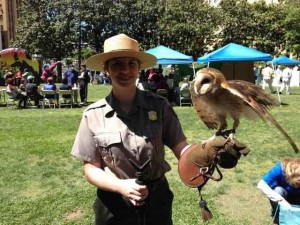For Deana Hughes, Southern Arkansas University has been a part of her family as long as she can remember. Her father attended SAU, and her sister, Traci Hughes, teaches at the University. She remembers coming with her family as a young girl to watch football games and seeing the Mulerider mascot dash across the field.
“I remember telling my parents that I wanted to come to SAU and bring my horse and be the Mulerider,” Hughes said. “I thought that is the greatest thing ever – a school where you can bring your horse. Who wouldn’t want to go there?”
The Southern Arkansas University junior still pursues a passion for all things environmental and animal sciences. Hughes has worked as a biological tech for the National Park Service in Hot Springs since she graduated from the Arkansas School for Mathematics, Sciences and the Arts.
Her passion for environmental science and animals motivates her and is what drew the attention of the park’s Natural Resource Program Manager Dr. Steve Rudd. Rudd visited ASMSA and was intrigued and impressed by Hughes’ entry titled “Magnetic Cows” in the school’s annual science fair. (The Prescott native had done some of her research for the project at SAU.)
 Rudd offered Hughes an opportunity to work for the Hot Springs National Park– an extremely rare offer to someone just out of high school.
Rudd offered Hughes an opportunity to work for the Hot Springs National Park– an extremely rare offer to someone just out of high school.
One of her work assignments required Hughes to do extensive research on the Ozark chinquapin (Castanea ozarkensis), a strain of American chestnut trees that once grew rampantly through the Ozark Mountain region. The native chestnut trees were a mainstay in the region’s forests from Mississippi and Arkansas up through Missouri. They produced sweet nuts inside spikey shells that were harvested for food and sold at market until the 1950s and 1960s when blight spread through the area and diminished all forms of chestnut trees – including the Ozark chinquapin – from the regional landscape.
We were asked to do a population count because the species was being reviewed to determine if it belonged on the endangered species list,” said Hughes. “I came across a paper that was written about the tree growing in an area of the park, but we were concerned because a prescribed (controlled) burn to kill underbrush had just been done in the area the trees were supposed to be.”
Hughes scoured thousands of acres in the vast Hot Springs National Park looking for any signs of the plant form thought to be endangered.
After a steep climb off the public trail in the national park, Hughes found a strand of the Ozark chinquapin thriving in a remote area of the park. She also participated in creating a survey map of the conditions within which the chinquapins thrived. That information is used by research labs to create blight-resistant versions of the tree so they can again replenish the forests of the region.
She loves what she does and wants to continue with the National Park Service as long as she can, but with positions in the federal programs being limited, openings are rare and landing a job with the NPS with widespread budget cuts is almost as difficult as winning the lottery.
As soon as Hughes saw the mass email from the National Collegiate Honors Council and honors program director of North Arizona University, she recognized it as the opportunity of a lifetime. A chance to spend a semester in the Grand Canyon working with environmental experts from NAU and the National Park Service (NPS) in her chosen field of study would open doors for her and get her a foot in the door to her dream job.
Hughes was determined to not allow this flash of opportunity to pass, but the short window of time to complete the application process, meant that Hughes had a week to get her application ready, which included filling out scads of forms, writing two essays, providing scholarship information, transcripts and at least two teacher recommendation letters from Honors College Director Dr. Ed Kardas and Biology Professor Dr. Viktoriya Street.
“I had to overnight it to get it there in time,” Hughes said. “I want to stay working with the National Park Service, but experience to work in a western park is hard to get unless you know someone who can help you get your foot in the door. Environmental science is a personal interest of mine, so I look at this opportunity as a more of a career move.”
Hughes’ rushed efforts paid off. She was selected for the honor and will spend the entire fall semester studying the Grand Canyon environment participating in field trips floating the Colorado River, staying in Native American canyon dwellings called Hogans, studying in classrooms, art galleries and learning in the great outdoors.
“I’ve never been outside of Arkansas, except for a few conferences,” said Hughes. “It’s a great stepping stone to where I want to be, but I’m sure it will be a big awakening for me.”
For Hughes, coming to SAU was one more step in fulfilling a dream. The ambitious biology major earned a place in SAU’s Honors College and also received the Blue and Gold Scholarship, the Encore Spirit Award, as well as the Arkansas Challenge Scholarship. Hughes was also named Arkansas Phi Beta Lambda Member of the Year, among other awards issued by the academic organization hosted by the SAU College of Business.




